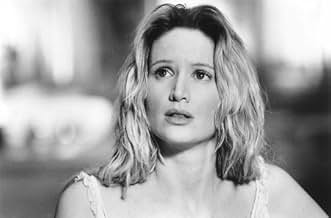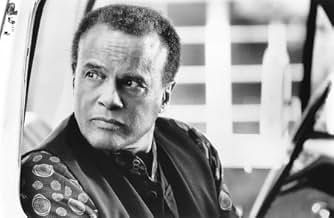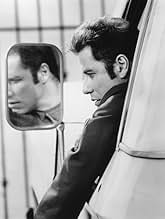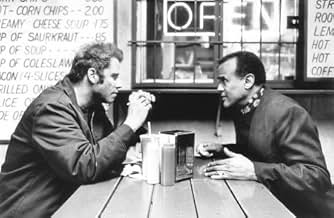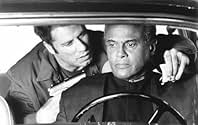In an alternative America where African-Americans and White Americans have reversed cultural roles, a white factory worker kidnaps a black factory owner for dismissing him over perceived dis... Read allIn an alternative America where African-Americans and White Americans have reversed cultural roles, a white factory worker kidnaps a black factory owner for dismissing him over perceived disdain.In an alternative America where African-Americans and White Americans have reversed cultural roles, a white factory worker kidnaps a black factory owner for dismissing him over perceived disdain.
- Sheriff #1 at Eviction
- (as Lawrence Mandley)
- Director
- Writer
- All cast & crew
- Production, box office & more at IMDbPro
Featured reviews
The film ultimately left me frustrated because I thought the idea was a good one but the story simply wasn't multi-faceted enough to be engaging. Aside from the characters played by Travolta and Belafonte, most of the supporting cast was very underwritten, particularly the families of both men. However, the performances were very good, and I thought Belafonte conveyed the defeatism and inherent arrogance of his role particularly well.
Overall though, I thought this was pseudo-art: it masqueraded as a deep and meaningful examination of the social relevance of race, but ended up as a very simplistic story disguised by delusions of self worth.
5/10
Strangely I'd forgotten all about this movie until it was broadcast on BBC1 a couple of nights ago and it's not difficult to understand why it's an obscure flop . The film starts with a black family gathered at the dinner table where patriarch and businessman Thaddues Thomas states his dislike for white people and their problems . Cut to Louis Pinnock who who works for Thomas company and lives in a rough area where his neighbours all seem to be pecker woods . Later due to a series of contrived , not very well written circumstances Pinnock loses his job with the company and decides to kidnap Thomas
The problem with WHITE MANS BURDEN is that this is an alternative world where Black Americans are at the apex of social hierarchy while whites are at the bottom bu this scenario is never ever explored . In fact the only things were shown that things are so mightily different is when someone is flipping the TV channel that show amongst other things a western where all the calvarymen are black . I know this was made in 1995 but is director Desmond Nakano saying there's no white equivalent of Morgan Freeman , Condaleeza Rice or Colin Powell ? For goodness sake we're even shown a black golfer on TV . Is this version of America without a white golfing prodigy called Alpine Woods ?
So that's the main problem and an unforgivable one where we're told that everything is different but as the plot rolls along we find ourselves asking what is actually different ? The audience are shown a couple of black cops being confronted by an angry white mob ( This doesn't happen in " our " America ? ) , a white man with a black companion are threatened by pecker woods ( This doesn't happen in " our " America ? ) etc , etc . At no point is the premise used to explore how anything would be different in " our " America . If you made a film set in " our " America where a disgruntled white employee kidnaps his racist black boss then you would not have to alter one single word never a single scene from this screenplay . And disgruntled employees kidnapping nasty employer type redemption plots we never all that compelling in the first place
The movie gets a politics critical about reversed stereotypes with anti-racism parable. Gimmicky plot is proceeded with slickness and intelligence. The original premise makes a real impact, adding the excellent acting by two main actors and magnificent secondary cast. John Travolta is top-notch as desperate worker driven by anger,demanding justice and extraordinary Harry Belafonte as cocky member of social elite. Supporting cast is frankly awesome, Kelly Lynch as affectionate wife, Tom Wright as bigoted chief, besides, Margaret Avery, Tom Bower, Carrie Snodgress,Sheryl Lee Ralph, among others. The picture displays atmospheric cinematography by Kurant and appropriate soundtrack by Howard Shore(Lord of Rings,The aviator),usual David Cronemberg's musician. The flick is well produced by Laurence Bender(Reservoir dogs,Pulp fiction). The motion picture is professionally directed by Desmond Nakano, a prestigious screenwriter. However failed in the Box-office and Nakano only directed another picture titled American pastime and again with no success.
Well anyways, I think the movie was good for rousing up these feelings of disturbance, however it lost me when the whole kidnapping took place. It became the focal point of the movie and confused many of its viewers. Other than that, the movie was ok. I give it a 8 on a scale from 1 to 10, only because I have never seen such a bold attempt to deal with race roles as this one. Therefore, I enjoyed the movie.
From the opening I felt chills. Was this chocolate factory scene, brown being poured on top of white, some horribly clumsy use of imagery? I feared so. The film looked set to be heavy-handed, and it was. The movie's flaw is that it over-does it's premise - nearly all the white people are poor and rundown, while all the black people come across as elitist snobs. The underlying message of course being that in "our reality" the situation is reversed and this gives a horribly, simplistic, and downright irritating attitude towards race. It's completely simplistic and infuriating - not because you're angered that it's right but because it's done so poorly and with a preachiness that grates.
It might all be OK if there was a story to support it. There isn't. Reeking of TV movie-of-the-week, John Travolta is playing a desperate factory-worker who kidnaps his ex-boss in a bid to get the money he lost from being fired unfairly. *Yawn*. There's no suspense and no tension in their scenes. There's the boring, trite situation where the boss, played by Harry Belafonte, starts to understand Travolta's cause. Far too obvious in coming. There's even the hilariously poor moment when Belafonte's son takes home a white girl to a look of distaste from his mother - bang that message-hammer on our heads Mr Nakano (the script writer). I'm reminded of a moment from "Don't Be a Menace to South Central While Drinking Your Juice in the Hood" when the character is similarly preachy and the postman turns to the screen and says "Message!" pointing out how morale messages are weakly delivered. In fact the only decent bit is about two minutes from the end, and even that's ruined by the (incredibly) obvious follow-up final minute. *Yawn*.
Travolta does nothing for this picture. This film was released after his sudden re-emerge in "Pulp Fiction", but I imagine he made it while still wandering around the Turkey Farm. His performance is as forgettable, as is usual with him and Belafonte is just OK.
Nothing can make me recommend this piece. If you want a movie about race issues why not watch the infinitely superior "American History X". This movie has a dreadful plot, weak acting, and destroys a promising premise by being both heavy-handed and insultingly simplistic. Avoid. 2/10.
Did you know
- TriviaQuentin Tarantino urged both John Travolta and Kelly Lynch to act in the film. Tarantino's production company, A Band Apart, produced the film.
- GoofsAll entries contain spoilers
- Quotes
[Last lines. Mrs. Pinnock has just refused to accept from Mr. Thomas the money he owed her husband]
Thaddeus Thomas: Why don't you keep it? I can give you some more if you think... if you think it's not enough.
Marsha Pinnock: How much is enough, Mr. Thomas? How much will ever be enough?
[turns, shuts the door and walks away]
- How long is White Man's Burden?Powered by Alexa
Details
Box office
- Budget
- $7,000,000 (estimated)
- Gross US & Canada
- $3,734,870
- Opening weekend US & Canada
- $1,743,251
- Dec 3, 1995
- Gross worldwide
- $3,734,870
- Runtime1 hour 29 minutes
- Color
- Sound mix
- Aspect ratio
- 1.85 : 1
Contribute to this page





